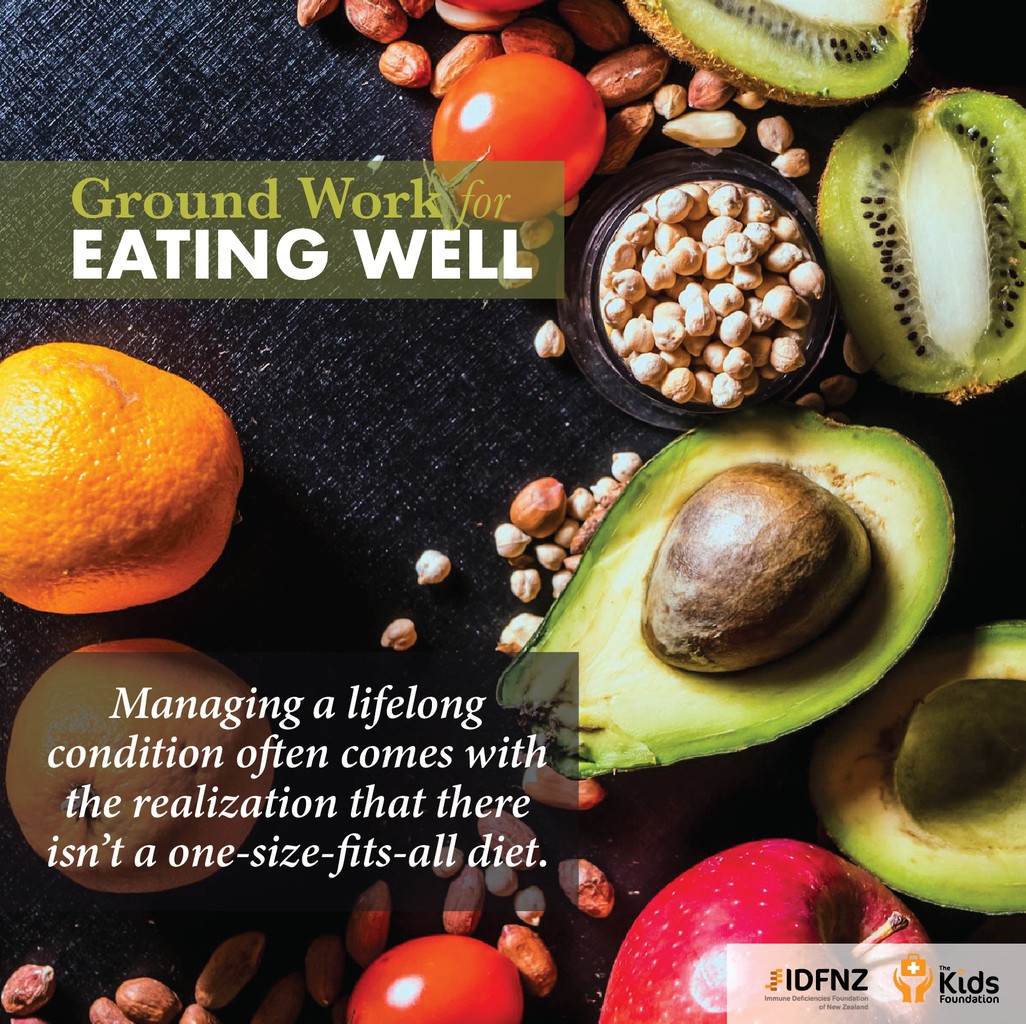Groundwork for Eating Well
Wed Jan. 1st 2025

Managing a lifelong condition often comes with the realization that there isn't a one-size-fits-all diet.
Good Nutrition

When living with a lifelong medical condition, dietary advice can feel like a constant wave of confusion. Whether it's from a magazine, a friend, or a self-proclaimed expert in the supermarket aisle, topics like fats, gluten, dairy, sugars, gut health, and omega-3s can feel overwhelming. It’s understandable if you’ve thought it’s impossible to keep track of what truly supports your health.
Managing a lifelong condition often comes with the realization that there isn’t a one-size-fits-all diet. While diet alone may not be a cure, it can play a key role in managing symptoms, supporting your body’s needs, and contributing to an overall sense of well-being.
Instead of chasing ever-changing food rules, focus on simple, practical steps to make eating well part of your routine. Don’t feel the need to change everything overnight—adopt these ideas gradually and in ways that suit your life and condition.
Eating Together
With busy schedules, medical appointments, and work, finding time for sit-down meals can feel impossible. However, making an effort to eat together with loved ones - even a couple of times a week - can be powerful.
Sharing meals fosters connection, reduces stress, and often leads to more mindful eating habits. Eating as a family or with friends creates space to bond, share stories, and even talk over the stresses of daily life. Plan out a few times a week where you can all sit, eat and enjoy the time together. Sharing with others is all part of coping and living well with your condition.

Limiting Portion Size
Managing portion sizes can be especially important if your condition is affected by weight management or digestion. Portion sizes are known to contribute to overeating. We tend to eat almost all of what we serve ourselves, so controlling portion sizes can help prevent overeating. Try swapping out your usual plate or bowl, or re-portioning snacks into individual portions for a smaller alternative. What’s more, you will tend to feel just as satisfied having ‘finished’ your meal. ‘Eating well’ doesn’t mean you have to give up your favourite treats either. That would make life extremely dull! Instead, opt for a smaller portion, and truly enjoy every bite.
Hydration: Water First!
Staying hydrated is crucial for overall health and can be especially helpful in managing symptoms like fatigue, joint pain, or digestive issues. The long-held belief that you need at least eight glasses of water per day, is in fact, a myth. Individual factors like body size, climate, underlying conditions and how much you sweat determine how much water you need.
The human body is beautifully designed to let you know when you need to drink. Pay attention to those cues and drink when you are thirsty. Our body functions best when it is hydrated, and it makes sense to hydrate with water, rather than sugary drinks and empty calories. Staying well hydrated also helps you to distinguish between actual hunger and thirst. Getting enough water each day improves digestion, regulates body temperature, lubricates joints, delivers vital nutrients to cells, and keeps organs functioning well – key factors when navigating a lifelong condition! It can also improve your sleep quality, cognition, and mood - those are some huge positives!
Slow Down
When life gets busy, it’s easy to rush through meals without paying attention to hunger signals. When schedules are jam-packed we can fall into the habit of scoffing down food without a second thought. Eating too quickly makes you less aware of getting full — and before you know it, you’ve overeaten.
Slowing down allows you to enjoy your food, which helps satiety. Meal satisfaction may also lead to less snacking later in the day. The food we eat is more than just nutrition! Take time to enjoy the taste, the smell, and refuse to rush it down as if it’s going to run away on you.
Taking the time to eat slowly not only improves satisfaction but also supports better digestion—which is of great benefit to anyone managing chronic health challenges.
Mind the Sugar
Many of us consume more sugar than we realize. Sugar, like salt, hides in many of the processed foods we buy. Excess sugar can negatively impact your energy levels, weight, and even your immune system. Eating too much sugar contributes to an excess of calories, which can also lead to weight gain.
The good news is that cutting down on sugar may be easier than you think! Be aware of what you are drinking, and the amount of sugar in your coffee, tea, soft drinks and juices. As mentioned earlier, water is a better choice if you’re watching your sugar intake, or try reducing a ‘2 sugars’ tea to just the one. Keep an eye on your cereals at breakfast, and the amount of sugar added on top; opt for fresh fruit or unsweetened yoghurts.
If you do have a sweet tooth, don't forbid sugar altogether; you're liable to become more focused on something that is forbidden! Aim to satisfy your sweet tooth with small amounts less regularly and learn to savour it.
Celebrate Fruits and Vegetables

For those managing a chronic condition, focusing on what to include in your diet can be more empowering than worrying about what to avoid. Fruits and vegetables are packed with vitamins, antioxidants, and nutrients that support your immune system and overall health.
Berries, broccoli, avocados and leafy greens, citrus fruits, root vegetables, carrots and apples, to name a few - fruits and vegetables are bursting with nutrients and vitamins for good health. The best thing is they don’t need to be added to, as they are also rich in their unique flavours and textures.
Keep it interesting! Experiment with cooking methods, try new herbs and spices, or snack on raw veggies with a dip. Variety not only prevents boredom but also ensures a wider range of nutrients. These nutrients will really help your body to function as well as it can, as you’re feeding it with the fuel it needs.
